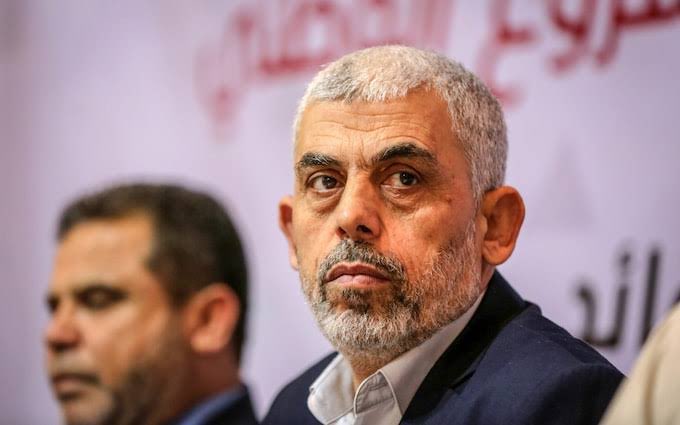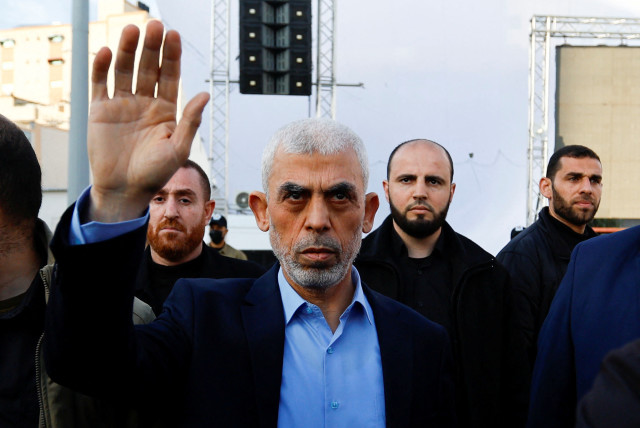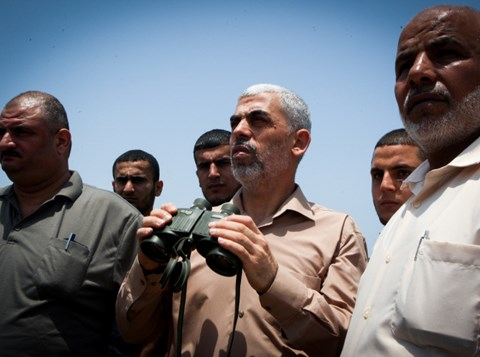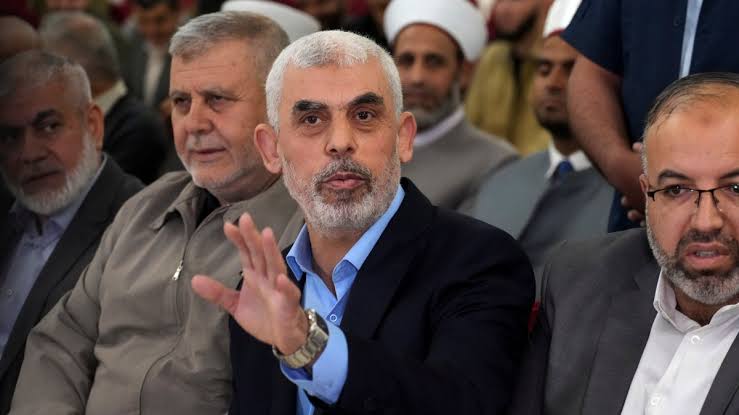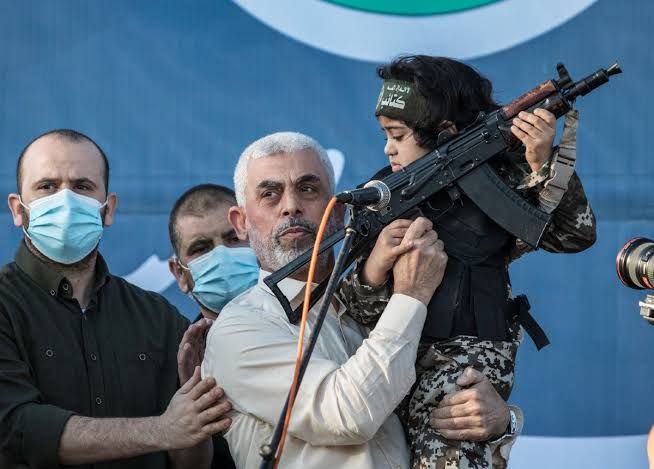Tue 19 December 2023:
Beirut, Lebanon – Since October 7, when Hamas’s Operation Al-Aqsa Flood broke through the barrier Israel built around Gaza, stormed Israeli towns, killed 1,200 people and took another 240 hostage, Israeli authorities have had their target on one man: Yahya Sinwar.
Israeli officials say Sinwar, Hamas’s leader in Gaza and a member of its politburo since 2013, was one of the masterminds behind the October 7 attack, along with Mohammed Deif, the commander of Hamas’s military wing the Qassam Brigades, and Marwan Issa, Deif’s deputy. But Sinwar seemingly has the biggest target on his back, as Netanyahu and other Israeli officials have called him a “dead man walking”.
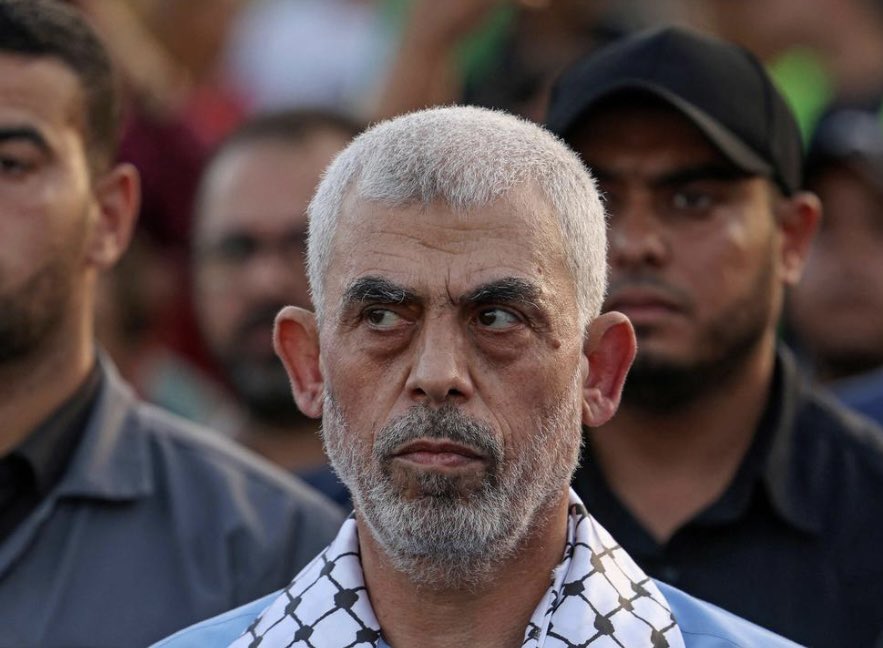
A near-mystical villain
Sinwar, also known as Abu Ibrahim, has myriad stories around him, most adding to the idea that he is a near-mystical villain.
Lieutenant Colonel Richard Hecht, an Israeli military spokesman, called Sinwar, “the face of evil,” while United States President Joe Biden described the attack Sinwar allegedly planned as “sheer evil”. Israeli Prime Minister Benjamin Netanyahu, meanwhile, has warned that if Hamas is not defeated, “Europe will be next and no one will be safe” and has made a concerted effort to conflate Hamas with ISIL (ISIS).
This man painted as “the face of evil” was born in 1962 in a refugee camp in Khan Younis, southern Gaza, to a family that had been displaced by Zionist gangs during the Nakba, or “catastrophe” of 1948. They were from al-Majdal, a Palestinian village razed and built over to create the Israeli town of Ashkelon.

Before he turned 20, in 1982, Sinwar was first arrested by Israeli authorities for “Islamic activities”. In 1985, he was arrested again, and it was during this second stint in prison that he met and became close to Hamas’s founder Sheikh Ahmed Yassin.
Sinwar was drawn to Hamas and, at 25, he helped establish al-Majd, the group’s internal security organisation, which earned him an uncompromising reputation in dealing with Palestinians who collaborated with Israel.
Adding to that reputation was former Shin Bet officer Micha Kobi’s interview with the Financial Times telling of Sinwar boasting to him in the late 1980s about making the brother of an alleged informer bury the accused man alive.
In 1988, at 26, Sinwar was arrested and charged with plotting the murder of two Israeli soldiers and killing 12 Palestinians. He was given four life sentences.
During the next 22 years in prison, Sinwar remained strictly disciplined, learned to speak and read Hebrew fluently and became a leader among the prisoners and a focal point for negotiations with prison staff. An Israeli government assessment from his time in prison described Sinwar as charismatic, cruel, manipulative, content with little, cunning and secretive, according to the BBC.
Rise to the top
On October 18, 2011, Israel exchanged more than 1,000 Palestinian prisoners for Gilad Shalit, an Israeli soldier who was kidnapped by Hamas, and Sinwar was among the Palestinians traded for Shalit.
Outside jail, Sinwar quickly climbed the ladder in Hamas. His name landed on Netanyahu’s desk as a target for assassination, but the Israeli premier allegedly rejected plans to kill Sinwar on several occasions. In 2013, he was elected as a member of Hamas’s politburo in the Gaza Strip, before becoming the movement’s leader in Gaza in 2017, replacing Ismail Haniyeh.
“Sinwar has shown himself to be a skilled leader,” Daniel Byman, senior fellow at the Center for Strategic & International Studies, told Al Jazeera, “and the political stakes for Israel are even higher because he was released as part of a previous prisoner exchange.”
After ascending to the top role, Sinwar was part of reconciliation talks with the Palestinian Authority. But the talks eventually broke down. Sinwar has since viewed the PA with animosity.
Still, in 2018, Sinwar signalled that Hamas’s tactics were moving towards non-armed resistance. Another war with Israel is “definitely not in our interest,” he said at the time.
“Sinwar is a pragmatist, shifting between political engagement and armed violence according to circumstances,” Hugh Lovatt, a senior policy fellow at the European Council on Foreign Relations, told Al Jazeera.
But by late 2022, Sinwar’s calculus seemingly changed. On December 14, 2022, Sinwar and other Hamas leaders told a large crowd in Gaza they predicted an “open confrontation” after Israel elected the most right-wing government in its history. Sinwar’s threats were repeated in early 2023.
As the group’s chief, he worked on foreign relations, including restoring ties with the Egyptian leadership and rebuilding links to Iran after disagreements over the Syrian civil war. Today, Sinwar is second only to Ismail Haniyeh in Hamas’s hierarchy.
“He is considered to be one of the key figures who moved Hamas toward a more militant stance,” Byman said.
This is possibly because he is more visible than other Hamas leaders. For example, analysts like Lovatt believe Deif was the true mastermind of the October 7 attack. But unlike Sinwar, who is known for his fiery public speeches, Deif has not been seen publicly in years.
Analysts believe Sinwar is playing a key role in the current negotiations over the exchange of captives and prisoners between Hamas and Israel.
While in captivity, an 85-year-old Israeli peace activist who has since been released said she confronted Sinwar when the Hamas leader visited the tunnels where captives were being kept.
“I asked him how he is not ashamed to do such a thing to people who all these years have supported peace,” Yocheved Lifshitz told an Israeli newspaper. “He didn’t answer. He was silent.”
Yet peace also appears far from the minds of many Israeli and American officials, say other analysts.
They argue that by seeking to paint Sinwar and Hamas as nihilistically violent, Israel and the West are deliberately sidelining any legitimate political aims Hamas has, such as the release of political prisoners or halting settlement expansion in the occupied West Bank.
“This is a standard aspect of civilisational discourse,” Osamah F Khalil, author of America’s Dream Palace: Middle East Expertise and the Rise of the National Security State, told Al Jazeera.
“There is an Orientalist notion built in to define Hamas and Sinwar as so beyond the pale that it justifies the deaths of 9,000 children and the wide-scale destruction of Gaza.”
‘Hitlers’ through the years
Throughout history, many of Israel’s enemies have been compared with Hitler, according to Tamir Sorek, a professor focused on conflict and resistance in the context of Palestine/Israel at Pennsylvania State University.
These “enemies” included Yasser Arafat, the former PLO chairman who became a key partner in negotiating peace with the Israelis, and former Egyptian President Gamal Abdel Nasser, who Khalil points out was “described as Hitler on the Nile”.
“Hamas’s atrocities on October 7 had a huge impact on Israeli society [and] activated collective memories of the Holocaust and anxieties of annihilation among Jews everywhere,” Sorek told Al Jazeera.
Still, the references to Sinwar as a Hitler-like figure, made by Netanyahu and others in Israel is also a political decision, he suggested.
“[This] also removes any responsibility from Israel as a political entity and from the Zionist project because if Jews are being attacked because they are Jews, there is no need to take the massacre of October 7 into a historical context, to talk about the siege on Gaza, the 8,000 Gazans killed by Israel from 2000 until October 7, the occupation, or the broader apartheid regime that has been built in Palestine-Israel.”
More than 18,000 people have been killed in Gaza since October 7.
Dehumanising enemies — including ordinary Palestinians more broadly — helps Israel strengthen its argument for continuing the attack in Gaza despite international calls for a humanitarian ceasefire.
“Killing or capturing him would enable Israel to claim a form of victory even if much of Hamas’s leadership remains untouched,” Byman said.
To adapt to Israel’s tactic of targeted assassinations, Hamas has adapted its leadership structure to be less centralised.
“Without Sinwar, and even after the loss of much of Hamas’s senior leadership, the organisation would still control Gaza because rivals are weak and because it has a large number of leaders and fighters, so killing or capturing many of them would not fundamentally defeat the organisation,” Byman added.
At the same time, if Sinwar evades death or capture, that could play into the prolonged punishment of Gaza by Israel.
“Israel doesn’t need an excuse to launch air strikes against Gaza,” Khalil said. “You can always have that bogeyman out there.”
The statements, views and opinions expressed in this column are solely those of the author and do not necessarily represent those of Independent Press.

______________________________________________________________
FOLLOW INDEPENDENT PRESS:
WhatsApp CHANNEL
https://whatsapp.com/channel/0029VaAtNxX8fewmiFmN7N22
![]()
TWITTER (CLICK HERE)
https://twitter.com/IpIndependent
FACEBOOK (CLICK HERE)
https://web.facebook.com/ipindependent
Think your friends would be interested? Share this story!



